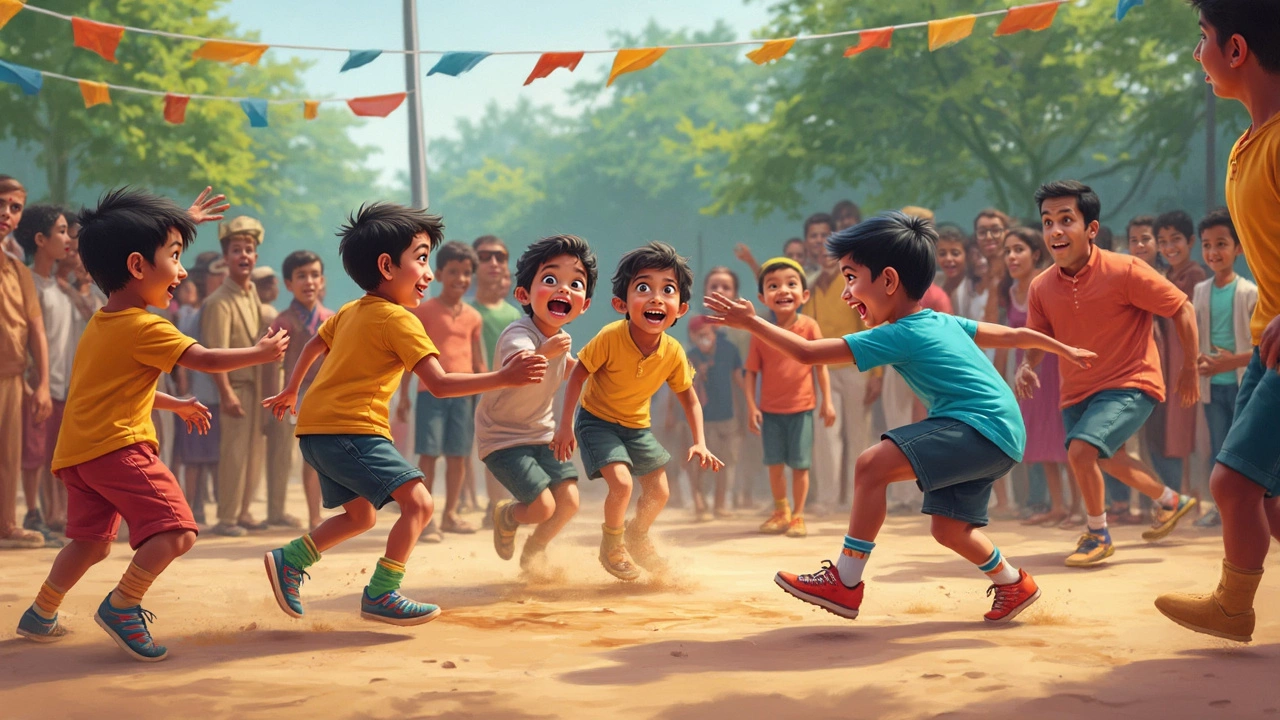
Picture any playground or office: there’s always that one person who has to win, no matter if it’s hopscotch or quarterly sales. Some folks seem wired for competition—they get lightning in their eyes during a friendly board game, or their mood sours if they slip from first place. Is it just upbringing, or is it deeper, maybe even a fundamental part of their personality? If you could bottle whatever makes someone obsessed with being the best, what would be in that bottle? A dash of risk-taking? Maybe a sprinkle of stubbornness? Scientists have been poking around these questions for decades, and the findings might surprise you. Turns out, it’s not just one trait or one magic type, and the real answer runs deeper than any quiz can measure.
The Science Behind Competitive Personality Types
Dive into any group of school kids, and you’ll spot it—the one who must cross the finish line first, the one who pouts when they lose, the one who keeps playing until they win. Competitive streaks show up early, and while parents and teachers can nudge or shape them, research says biology has a big hand too. Twin studies, like those out of King’s College London, have shown that about 50% of competitiveness is inherited. That means if you thrive on crushing your tennis rival, you might owe your competitive edge to your genes as much as your gym teacher.
What’s happening in the brain? The reward circuits light up like a pinball machine every time we win. Dopamine—the feel-good chemical—surges, making victories sweet and motivating. For some people, this system is extra sensitive, which can crank their competitive drive up to eleven. Testosterone levels can play a role too—studies suggest folks with higher testosterone, regardless of men or women, tend to be a bit more aggressive in competitions. But don’t think it’s just hormones and hardwiring. The culture you grow up in shapes how your competitive spirit plays out. In the U.S., competition is often praised, even expected—think college admissions or the NFL draft. But in more collectivist cultures, overt competitiveness can be frowned upon, and working with others prized over winning.
This leads us to personality psychology. The Myers-Briggs system, familiar to anyone who’s taken an online quiz, divides people into 16 types. While it should be taken with a grain of salt, research and real-world trends suggest certain types pop up more often among the hyper-competitive crowd. ENTJs (Extroverted, Intuitive, Thinking, Judging) often headline the lists—they’re known for their confidence, goal orientation, and relentless desire to lead. ESTJs also rank high; these organizers love structure and don’t hide their need to win. INTJs (the so-called Masterminds) aren’t far behind, though their competitiveness might be more about innovation and strategy than showboating. What ties them all together? An analytical drive, hunger for achievement, and very little patience for coasting along.
That said, don’t overlook traits in the "Big Five" approach—another way psychologists break down personality. The Big Five model rates people on Openness, Conscientiousness, Extraversion, Agreeableness, and Neuroticism. High conscientiousness and low agreeableness often show up in competitive folks. High conscientiousness means someone who is disciplined, organized, and committed to goals. Flip side, low agreeableness means they don’t mind stepping on a few toes. A groundbreaking 2017 study by Dr. David Caruso at Yale found that people who scored in the top 20% for competitiveness, across careers, usually reported both these traits.
Check the table below for how different personality types and traits line up with competitiveness based on peer-reviewed studies.
| Personality Type / Trait | Competitive Drive (1-10) | Typical Field |
|---|---|---|
| ENTJ (MBTI) | 10 | Business, Leadership |
| ESTJ (MBTI) | 9 | Management, Military |
| INTJ (MBTI) | 8 | Science, Tech, Chess |
| High Conscientiousness (Big Five) | 8-10 | Academia, Medicine |
| Low Agreeableness (Big Five) | 7-9 | Sales, Law |

Traits That Fuel the Fire: What Really Makes Someone Competitive?
A lot of people peg competitiveness as simply “wanting to win,” but honestly, that doesn’t cover it. My daughter Mira, for example, will throw herself into any challenge—could be bike races or geography bees—not because she just wants a trophy, but because she craves the thrill of measuring herself against others. With kids and adults alike, psychologists see the same patterns. There’s a cocktail of traits that cooks up fierce competitors, and you can spot them if you know what to look for. First, ambition. Not settling. This isn't just about getting As on a test—it’s about raising the bar every time. Studies show that highly competitive people often score off the charts on achievement motivation. They don’t clock out when everyone else does—they stay, polish their work, and show up early next time. Nothing is ever just 'good enough.'
Next is risk tolerance. Sure, some competitors are cautious, but most thrive on pushing past comfort zones—taking leaps, shooting their shot even when the stakes are high. In an interesting 2021 study by Stanford, competitive high-performers in tech roles were 22% more likely to change jobs and try new ventures, compared to their more agreeable peers, even with solid job security. That drive to leap into the unknown—sometimes it's a superpower; sometimes it looks a bit reckless.
Then you’ve got focus. Legendary athletes, top lawyers, and hard-driving CEOs often talk about “tunnel vision” when competing. They can block out everything else—background noise, doubts, even family squabbles. The world shrinks to just that challenge: get the ball in the net, land the big client, finish the project before anyone else. It’s not just natural talent; this focus is something highly competitive people train and protect. They create routines, avoid distractions, and sometimes become famous for their single-mindedness.
And don’t forget resilience. Competitive folks take losses hard—but here’s the twist: they learn from them. Instead of sulking, the top performers adapt, analyze what went wrong, and get ready to try again. This mindset—a growth mindset—has been a hot topic in psychology since Carol Dweck’s groundbreaking research at Stanford. Kids taught to see failure as “data,” not defeat, end up developing sharper competitive instincts as adults.
Curiously, one trait often missing from highly competitive people? High agreeableness. That’s not to say competitive types are jerks, but someone with sky-high agreeableness—always eager to avoid conflict or keep everyone happy—won’t go for the jugular in a contest. Sometimes competitiveness and collaboration can overlap, but more often, it’s the folks who aren’t afraid to ruffle feathers who fight hardest for a win.
To sum up these traits, here’s a quick cheat sheet:
- Ambition: The drive to set and achieve big goals
- Risk tolerance: Willing to embrace uncertainty for a shot at victory
- Focus: Intense concentration, often to the point of obsession
- Resilience: Bouncing back from losses, learning, and adapting
- Low agreeableness: Less worried about pleasing others, more comfortable with confrontation
What’s fascinating is how these personality ingredients play out in different fields. Look at athletes: many grew up not just loving their sport, but relishing competition itself—whether it's outpacing others or breaking their own records. Business leaders often have stories of “never being satisfied” or getting that extra edge by working all night while others slept. Even artists and writers can get fiercely competitive, chasing critical acclaim or the most likes on their latest post. It’s rarely just about the outcome—it’s about testing limits, proving themselves, and, sometimes, quieting the little voice that says, “You’re not good enough."

The Upside and Downside: Living—and Working—with Competitive Personalities
You’re probably wondering, is being ultra-competitive good or bad? There’s no simple answer—because life tends to make things messy. On the upside, competitive personalities usually get stuff done. They outperform others in high-stakes jobs, push tech and medical breakthroughs, and set new standards in sports and the arts. Teams with at least one competitive member spark more innovation. Why? Because the bar gets raised. Studies at Harvard Business School found that companies led by strong ENTJs or high-conscientiousness types churn out 18% more patents, on average, than those led by more consensus-driven leaders.
Competitiveness can also build resilience. When you’re wired to chase wins, you learn pretty quickly to bounce back after you trip up. Every loss is a lesson. That mindset, as gritty as it can be, is a buffer against burnout. In the U.S. Army, soldiers who scored high on competitive drive in psychological exams completed training at a 25% higher rate—a stat that shows how hunger to win can fuel stamina in tough conditions.
But it isn’t all medals and glory. There’s a darker side. Excessively competitive types can flirt with workaholism, snap at coworkers, or forget how to just enjoy the process. They might win the sprint, but lose friends along the way. High conflict rates, stress-related problems, and even ethical slip-ups can follow people who value winning above everything else. Take the banking scandals of the 2000s—many were driven by cultures that put massive value on beating the competition at any cost.
So, how do you harness competitive energy without letting it turn toxic? A few tips straight from sports psychologists, company leaders, and even family therapists:
- Channel your drive into clear, meaningful goals, not just “winning.”
- Build feedback loops: lose, learn, adjust, try again.
- Team up with people who balance your competitive streak—those with high emotional intelligence or patience.
- Celebrate progress, not just perfection.
- Remember that empathy and collaboration aren’t just for “nice” people—being a team player can actually help you win more often.
Here’s something that might surprise you: families can shape competitiveness too. Kids who see parents set tough goals, recover after setbacks, and value effort as much as winning build healthy competitive habits. In my house, it’s less about who’s best at Scrabble, and more about who can keep improving—or laugh hardest after a loss. The world’s most successful competitors, from scientists to Olympians, usually credit someone who believed in them, showed them how to lose gracefully, and never let them settle.
So, if you see yourself in the ambitious, driven, sometimes stubborn crowd, know that you’re not alone—and you’re in good company. The most competitive personality types don’t just chase gold medals or corner offices. They build, adapt, and inspire those around them. And more than anything, they remind us: life’s more interesting with a little competition, especially when we use it to lift each other higher.





